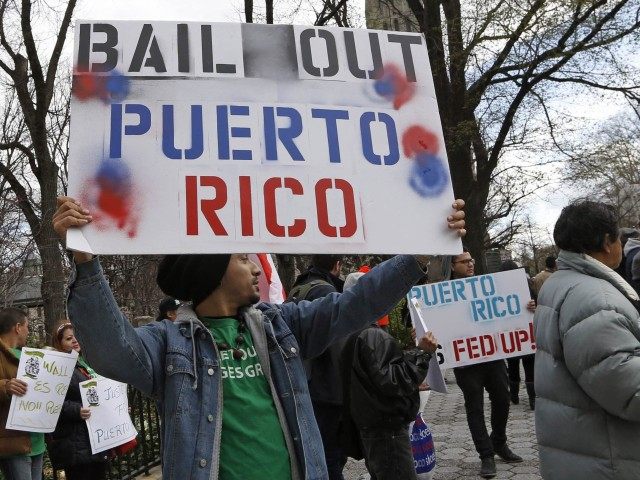Puerto Rico is set to file the largest public sector bankruptcy in history after vulture capitalist hedge funds that bought big pieces of the island’s $73 billion in defaulted debt for pennies-on the-dollar refused to take $24 billion haircut.
The U.S. territory made its last-ditch offer to try to avoid a May 1 bankruptcy filing, but failed to negotiate a financial restructuring that would force creditors to take a 23 percent loss on their general obligation bonds and a 42 percent loss on their Cofina sales-tax-backed debt, according to EMMA, the Municipal Securities Rulemaking Board website.
Puerto Rico’s bond defaults last summer caused the Obama administration to team-up with a bipartisan majority in Congress to pass “The Puerto Rico Oversight, Management and Economic Stability Act” (PROMESA), which turned over the island’s finances to a federally appointed committee and created a “Title III” bankruptcy process.
Breitbart News reported that the big motivation for taking over America’s worst welfare den was the fear of up to a million Puerto Ricans migrating to the mainland” if hedge fund “vulture capitalist” investors, who bought up the island’s bonds debt at about 30 cents on the dollar, were able to use lawsuits to shake down the U.S. government for a bailout by jeopardizing the island’s ability to pay for schools, police officers and health care.
PROMESA gave the control board defacto authority to sell government assets, consolidate agencies, and fire government workers to restructure the island’s balance sheet. It also put a retroactive stay on bondholder lawsuits to grab assets liens.
One key reason Puerto Rico’s economy has imploded was that the Popular Democratic Party-controlled legislature made Spanish the official language in 1991 for all schools and government use. Partly as a result, 86 percent of the island does not speak English in the home and almost a third of the residents are on welfare. Poor language skills have prevented the reaction of call centers and other U.S. service businesses to Puerto Rico.
Puerto Rico Catholic Archbishop Roberto Gonzáleziocese and Reverend Heriberto Martínez, the head of the Puerto Rico Bible Society, issued a joint statement this week: “If the oversight board and Governor do not act by April 28th, we fear that Puerto Rico could be held hostage by predatory actors and ‘vulture’ funds.”
But negotiating a settlement with the vultures became much more difficult after August, when an new audit of the union controlled Puerto Rico Employees’ Retirement System and two smaller public pension plans revealed that there are only about $1.8 billion in assets to pay $45 billion in pension liabilities.
With about 1 in 10 Puerto Ricans either government public employees, retirees, or beneficiaries, the audit revealed that Democrat Governor Alejandro Garcia Padilla spiked the island’s cash contribution to Puerto Rico’s pension plans from $400 million in 2015 to $747.3 million las July, rather than paying the defaulted bonds.
According to Jubilee USA’s executive director Eric LeCompte, who advises 650 local faith communities and worked on the Title III legislation, the Puerto Rico oversight board met in New York on April 28 to consider authorizing a Title III filing to prevent creditor lawsuits from liening the island’s assets and tax streams. He commented, “Puerto Rico’s time is almost up and it is the responsibility of the oversight board to now authorize the bankruptcy process.”
Prior to Puerto Rico, the largest public sector bankruptcies were: $19 billon on July 18, 2013 by the City of Detroit, Michigan; $4.2 on November 9, 2011 by Jefferson County, Alabama; and $2.6 billion on December 6, 1994 by Orange County, California.

COMMENTS
Please let us know if you're having issues with commenting.